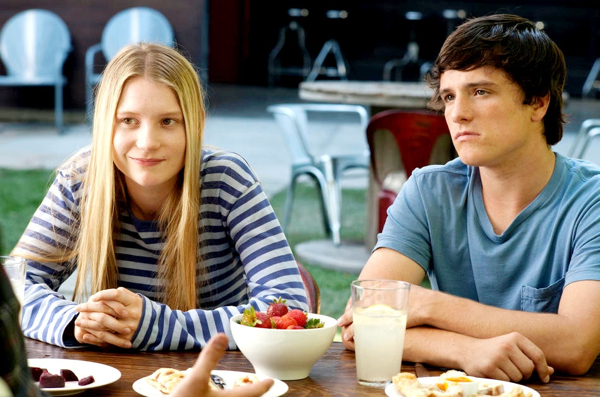Movie review by Greg Carlson
Filmmaker Lisa Cholodenko regularly cooks up dramatic conflict by introducing the threat of a newcomer or stranger into the daily grind of characters whose lives require some sort of jolt. In “The Kids Are All Right,” viewers can expect another of the director’s sunny Southern California soap operas. An indelicate mash-up of calculating tearjerker and broad comedy – much of it designed around an adulterous affair – Cholodenko’s third feature has been coarsely touted as a “Brokeback Mountain” for lesbians, but lacks the gravitas to match Ang Lee’s groundbreaking film.
To be fair, the only significant parallel between “Brokeback Mountain” and “The Kids Are All Right” is the presence of well-known actors playing homosexuals, but the former film was a heartbreaking tragedy and the latter film relies on wildly improbable humor. Many viewers will not be able to resist the portrayals provided by veteran stars (and heterosexuals) Annette Bening and Julianne Moore, and Cholodenko deserves praise for the effective manner in which she directs the two women. The dialogue, which Cholodenko co-wrote with Stuart Blumberg, too readily depends on liberal and literal doses of “…just sayin’,” along with goopy platitudes and an earnest inclusion of the overworked bit about hurting the ones you love. Add to all of this an unwelcome streak of casual entitlement and racism, and one can never be certain whether the central couple deserves our affection or contempt.
Mark Ruffalo plays the sperm donor whose genetic material helped produce Moore and Bening’s teenagers Joni (Mia Wasikowska) and Laser (Josh Hutcherson), and when the children track him down, the mothers aren’t sure how to react. Ruffalo’s roguish Paul is a follow-your-dreams stud who enjoys responsibility-free sex with a gorgeous employee at his organic restaurant. A motorcycling college dropout, Paul fascinates inexperienced recent high school grad Joni, who is navigating the treacherous waters of an attraction to a close male friend. Everyone will be tested and challenged, however, when Paul starts sleeping with Moore’s Jules.
Cholodenko goes to great lengths to remind viewers that sexuality is fluid, confusing, mysterious, and inexplicable (the “Moms,” as they are called by their offspring, watch gay male porn, for example) but resorts to the unfortunate cliché that any lesbian might be willing to “hop the fence” – as Jennifer Lopez’s gay character in “Gigli” put it – for the right man. Along with the practically unmentionable “Gigli,” variations of the trope have been covered cinematically in “Chasing Amy” and “Kissing Jessica Stein,” and on series television in “Queer as Folk” and “The L Word.” An argument has been offered suggesting that the device brings gay stories to wider audiences, but at what cost?
LGBT blogs have lit up debating whether Cholodenko is moving things forward or setting them back, and one could spend hours poring over the feedback and commentary sections of “The Kids Are All Right”-related articles at the Advocate, Lesbian Dad, Autostraddle and After Ellen, where Sinclair Sexsmith’s piece is one of the most thoughtful deconstructions of the movie that has been written so far. Individuals gay, straight, bisexual, and otherwise need to see the movie before passing judgment on whether the application of the “sex with a man” premise is a legitimate Trojan Horse or merely the perpetuation of another tired stereotype.
